
Flanders is the Dutch-speaking northern portion of Belgium and one of the communities, regions and language areas of Belgium. However, there are several overlapping definitions, including ones related to culture, language, politics, and history, and sometimes involving neighbouring countries. The demonym associated with Flanders is Fleming, while the corresponding adjective is Flemish, which can also refer to the collective of Dutch dialects spoken in that area. The official capital of Flanders is the City of Brussels, although the Brussels-Capital Region that includes it has an independent regional government. The powers of the government of Flanders consist, among others, of economic affairs in the Flemish Region and the community aspects of Flanders life in Brussels, such as Flemish culture and education.

North Brabant, also unofficially called Brabant, is a province in the south of the Netherlands. It borders the provinces of South Holland and Gelderland to the north, Limburg to the east, Zeeland to the west, and the Flemish provinces of Antwerp and Limburg to the south. The northern border follows the Meuse westward to its mouth in the Hollands Diep strait, part of the Rhine–Meuse–Scheldt delta. North Brabant had a population of about 2,626,000 as of January 2023. Major cities in North Brabant are Eindhoven, Tilburg, Breda, its provincial capital 's-Hertogenbosch, and Helmond

Hasselt is a Belgian city and municipality, and capital and largest city of the province of Limburg in the Flemish Region of Belgium. It is known for its former branding as the "Capital of Taste", owing to its local distilleries of Jenever, the Hasselt Jenever Festival, and Hasselt speculaas.
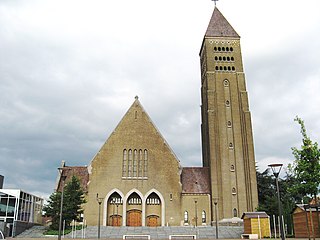
Genk is a city and municipality located in the Belgian province of Limburg near Hasselt. The municipality only comprises the town of Genk itself. It is one of the most important industrial towns in Flanders, located on the Albert Canal, between Antwerp and Liège.
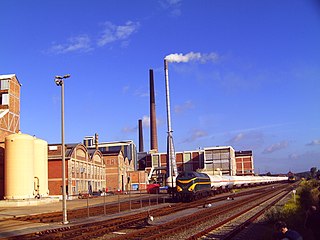
Tessenderlo is a municipality in the Belgian province of Limburg. It is where the three Belgian provinces of Limburg, Flemish Brabant and Antwerp meet at the front gate of the Averbode Abbey. The municipality Tessenderlo encompasses the villages of Tessenderlo proper, Schoot, Engsbergen, Hulst and Berg. On January 1, 2006, Tessenderlo had a total population of 16,811. The total area is 51.35 km2 which gives a population density of 327 inhabitants per km2. The name Tessenderlo means "(the open place in) the forest of the Taxandrians".

Maaseik is a city and municipality in the Belgian province of Limburg. Both in size and in population, it is the 8th largest municipality in Limburg. The town is the seat of the administrative arrondissement of Maaseik (kieskanton). Internationally, Maaseik is known as the assumed birthplace of the famous Flemish painters Jan and Hubert van Eyck.
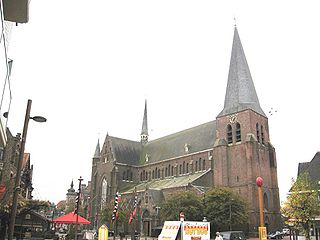
Neerpelt is a town in Pelt and a former municipality located in the Belgian province of Limburg. In 2018, the municipality had a total population of 17,174. The total area is 42.78 km2.

Voeren is a Flemish Dutch-speaking municipality with facilities for the French-speaking minority, located in the Belgian province of Limburg. Bordering the Netherlands to the north and the Wallonia region's Liège Province to the south, it is geographically detached from the rest of Flanders, making Voeren an exclave of Flanders. Voeren's name is derived from that of a small right-bank tributary of the Meuse, the Voer, which flows through the municipality.

Limburgish, also called Limburgan, Limburgian, or Limburgic, is a West Germanic language spoken in Dutch Limburg, Belgian Limburg, and neighbouring regions of Germany.

The Belgian Cup is the main knockout football competition in Belgium, run by the Royal Belgian FA. The competition started in 1908 with provincial selections as the "Belgian Provinces Cup". Starting from 1912 only actual clubs were allowed to partake. As of 1964, the Belgian Cup has been organised annually. Since the 2015–16 edition, the Belgian Cup is called the Croky Cup, for sponsorship purposes. The final traditionally takes place at the Heysel Stadium in Brussels.
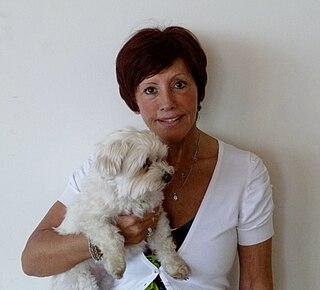
Jacky Lafon is a Flemish actress known for playing one of the lead fictional characters—Rita Van den Bossche—in the television series Familie that aired its first episode on the Flemish television channel VTM, in the Dutch language, on 30 December 1991. Familie remains a popular soap opera, airing its 1,000th episode in 1996 and as of 2016 is in its 25th year of production.

The Flemish Heraldic Council advises the Flemish Government on all matters relating to heraldry. The Council was created on 11 April 1984, as the successor to the Subcommittee for Heraldry or Subcommissie Heraldiek, established in 1978. Its prime task was to supervise the granting of a coat of arms and a flag to all municipalities of the Flemish Region. Following the reorganization of the Belgian provinces, the council's field of action was extended to provincial arms and flags in 1994. Since 2000, the Council has likewise advised the Flemish Government on grants of arms to Flemish individuals and corporations. In the meantime, more than 200 such grants have received official sanction. Grants of arms by the Flemish Government are published in the Belgian official journal.

Van Lanschot Kempen N.V. is a specialised, independent wealth manager that provides private banking, investment management and investment banking services to wealthy individuals and institutions. It is headquartered in 's-Hertogenbosch, the Netherlands. With a history dating back to 1737, it is the oldest independent financial institution in the Netherlands and the Benelux and one of the oldest independent financial institutions in the world.
Festival of Flanders is an annual music event at different locations in Flanders. It started initially as a "Summer Festival", but now its activities are spread from January to May, with a peak in late summer and early autumn.

Antwerp is a city and a municipality in the Flemish Region of Belgium. It is the capital and largest city of Antwerp Province, and the third largest city in Belgium by area at 204.51 km2 (78.96 sq mi) after Tournai and Couvin. With a population of 536,079, it is the most populous municipality in Belgium, and with a metropolitan population of over 1,200,000 people, the country's second-largest metropolitan region after Brussels.

Flemish (Vlaams) is a Low Franconian dialect cluster of the Dutch language. It is sometimes referred to as Flemish Dutch, Belgian Dutch, or Southern Dutch. Flemish is native to the region known as Flanders in northern Belgium; it is spoken by Flemings, the dominant ethnic group of the region. Outside of Belgium Flanders, it is also spoken to some extent in French Flanders and the Dutch Zeelandic Flanders.
The Limburg Zoo, also known as Zwartberg Zoo, was a zoo in the Belgian parish of Zwartberg in the municipality of Genk. The zoo was private property of the Wouters family and did not receive any subsidy or sponsorship. The zoo was known for its large number of animals, which resulted from the internal breeding programme and the acquisition of abused and dumped animals from bankrupt zoos and circuses. The large number of animals, the poor state of the animal enclosures, and actions by animal rights organisations drew media attention to the zoo. In 1997 the Wouters family decided to close it; the animals were relocated to other zoos.

Johan Sauwens is a Belgian politician from the province of Limburg.
The Antwerp Symphony Orchestra is the symphony orchestra of Flanders (Belgium), based in the Queen Elisabeth Hall in Antwerp. The orchestra is led by chief conductor Elim Chan and honorary conductor Philippe Herreweghe. The organisation, which is one of the seven art institutions of the Flemish Community, is one of the most important cultural representatives in the region. It is one of only two Belgian orchestras that have the right to style themselves as "royal", hence its full name "Antwerp Symphony Orchestra - the royal philharmonic orchestra of Flanders".
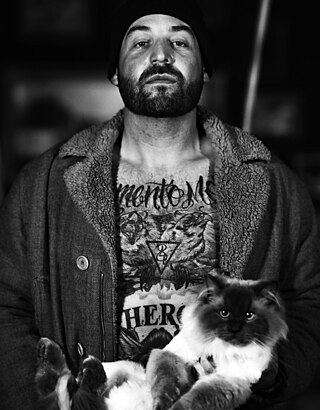
Tom Herck, born in 1984 in Sint-Truiden, Belgium, is a multidisciplinary Belgian artist currently residing in Ordingen. Drawing inspiration from his experiences in the underground football culture, illegal graffiti scene, and extensive travels worldwide, Herck's artistic expressions challenge societal norms with a rebellious and unconventional nature.
















